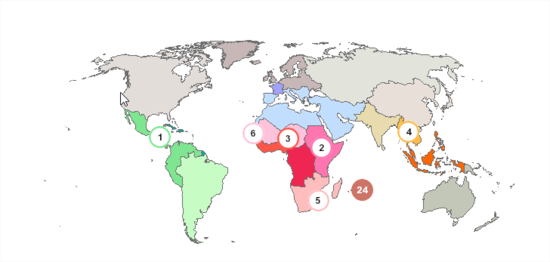Geographical initiatives
Objective
The aim of the Unit is to undertake shared geographical initiatives that are coherent with its scientific programming. It seeks to concentrate a greater critical mass of researchers at certain geographical locations, through assignments and support missions. These initiatives are preferentially constructed around:
- Research and Training Platforms in Partnership (RP) that have already received CIRAD labelling, in order to remain coherent with this overall policy of concentrating resources and improving the visibility of our operations in Southern countries.
- Partnership agreements with national agricultural research structures (NARS) and public or private development actors.
In general, research activities developed through these geographical locations are structured to enable Aïda research unit to feed its discussions and be more effective in terms of sustainable intensification of production, in geographical areas where the benefits of ecological intensification of annual crops are most expected and where it is sometimes the most difficult to implement them.
The geographical distribution of Aida Unit staff can be consulted on the Staff and Publications page (see "Location" column).
The geographical distribution of Aida Unit projects can be consulted on the Research projects and expertise page (see "Search for a project / by location").
Number of employees (permanent and fixed-term contracts) in the Aïda unit by geographical area (outside metropolitan France, January 2021)
Research and Training Platforms in Partnership (RPs)
Aïda research unit is involved in several RPs through assignments and/or support missions.
Development of production systems in high-altitude tropical areas
In Highland production systems and sustainability in Madagascar (SPAD) research and training platform in partnership, and which we are seeking to reproduce due to its excellent results and the experience it has provided.
Sustainability of cotton and cereal systems in the Sudan-Sahel zones
Associated with Agro-silvo-pastoral systems in West Africa (ASAP) research and training platform in partnership in Burkina Faso and with the Unit’s activities in other countries in this area.
Integrated pest management in sub-Saharan Africa (rice, other cereals and cotton)
In Design of agroecological systems based on pest management and organic waste use (DIVECOSYS) research and training platform in partnership, in Benin and Senegal.
Assessment of impacts and ecosystem services, environmental services and energy production in the Indian Ocean
In liaison with Services and Impacts of Agricultural Activities in the Tropics (Siaam) research facility in Reunion Island and the Indian Ocean.
Agroecological transition in South-East Asia
Through Agroecology in Southeast Asia (ASEA) research and training platform in partnership in various Southeast Asian countries
Varietal improvement for the diversity and complexity of agrosystems in sub-Saharan Africa
Innovation and plant breeding in West Africa (Iavao)
Support the development and implementation of new public policies in Southern Africa
Public policy and governance in southern Africa (GovInn)
Build with local actors environmentally friendly production alternatives
Forests, agriculture and territories in the Amazon (Amazonia)
Partnership agreements
In Cameroon's cotton zone: with Société de développement du coton du Cameroun (Sodécoton) and Institut national de recherche agricole pour le développement (Irad)
In Senegal's cotton zone: with Société de développement des fibres textiles (Sodéfitex) and Institut sénégalais de recherches agricoles (Isra)
In Benin's cotton zone: with Institut national de recherche agricole du Bénin (INRAB) and Institut de recherche sur le coton (IRC)
